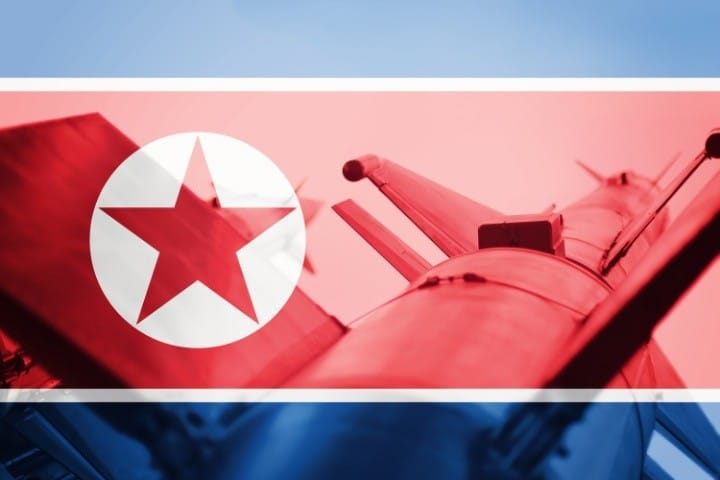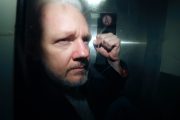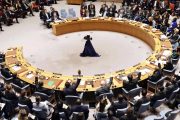
According to state media reports, amid promoting dozens of military officers who participated in the recent launch of a new ballistic missile, North Korean leader Kim Jong Un announced on Sunday that his country aims to have the world’s most powerful nuclear force.
Kim’s announcement and pledge to counter what he deemed as U.S. nuclear threats come after his Nov. 18 test of the Hwasong-17, the largest intercontinental ballistic missile that the country has.
North Korea’s “ultimate goal is to possess the world’s most powerful strategic force, the absolute force unprecedented in the century,” Kim declared, elaborating that strengthening the country’s nuclear arsenal would guard the sovereignty of the state and the people.
Photographed with scientists, engineers, and military officials involved in the test, Kim characterized the Hwasong-17 as the “world’s strongest strategic weapon” and said it showcases his country’s resolve and capability to gradually set up the world’s strongest army.
North Korean scientists have made a “wonderful leap forward in the development of the technology of mounting nuclear warheads on ballistic missiles,” and are slated to broaden and fortify the country’s nuclear deterrent capabilities at an unprecedentedly swift pace, he said.
Based on state media, those workers vowed to safeguard the “absolute authority” of Kim and the party, and pledged that “our missiles will fly vigorously only in the direction indicated” by Kim.
As a result of the launch of the Hwasong-17, which is capable of reaching the U.S. mainland, the United States has called for a United Nations Security Council (UNSC) presidential statement to hold North Korea accountable for its missile tests, which are banned by Security Council resolutions.
State media showed Kim’s daughter with him as he surveyed the officers. Her unexpected inaugural experience at the Hwasong-17 launch has fueled speculations about leadership succession in the communist totalitarian state.
North Korea’s powerful Standing Committee of the Supreme People’s Assembly gave the Hwasong-17 missile the title of “DPRK Hero and Gold Star Medal and Order of National Flag 1st Class,” state news agency KCNA reported in another statement. “DPRK” refers to the country’s official name, Democratic People’s Republic of Korea.
“[The missile] clearly proved before the world that the DPRK is a full-fledged nuclear power capable of standing against the nuclear supremacy of the US imperialists and fully demonstrated its might as the most powerful ICBM state,” KCNA said.
Meanwhile, South Korean President Yoon Suk-yeol warned of an unprecedented joint response with allies if North Korea proceeds with a new nuclear test. Yoon also urged China, North Korea’s closest ally, to dissuade North Korea from continuing their banned development of nuclear missiles and weapons.
In a comprehensive interview with Reuters on Nov. 28, Yoon called on China to step up their responsibility as a permanent member of the UN Security Council. Should China fail in doing so, an influx of military assets to the region would result, Yoon said.
“What is sure is that China has the capability to influence North Korea, and China has the responsibility to engage in the process,” Yoon said in his office. It was Beijing’s call to determine whether it would use its influence for peace and stability, he added.
Yoon said that North Korea’s actions have resulted in more defense spending in countries in the region, including Japan, and more deployment of U.S. warplanes and ships, and emphasized that it is in China’s interest to make its “best efforts” to induce North Korea to denuclearize.
When questioned about how South Korea and its allies, the U.S. and Japan, would react if North Korea conducts a new nuclear test, Yoon said the response “will be something that has not been seen before,” but failed to elaborate further what that would entail.
“It would be extremely unwise for North Korea to conduct a seventh nuclear test,” he said.
The shadow of communist North Korea’s tests loomed ominously over several multiple gatherings of global leaders in November this year, such as the Group of 20 (G-20) conference in Bali, where Yoon urged Chinese President Xi Jinping to step up efforts to regulate North Korea’s nuclear and missile provocations. In response, Xi urged Seoul to improve relations with Pyongyang.
Ahead of the G-20, U.S. President Joe Biden told Xi that Beijing was obliged to talk North Korea out of a nuclear test, although he said it was unclear whether China could do so. Biden’s national security advisor, Jake Sullivan, said before the meeting that Biden would caution Xi that North Korea’s persistent weapons development would result in an increased U.S. military presence in the region, something Beijing would be wary about.
South Korea and the United States have decided to dispatch more U.S. “strategic assets” such as aircraft carriers and long-range bombers to the area, but Yoon said he did not foresee any amendments to the 28,500 American ground forces stationed in South Korea.
“We must respond consistently, and in lockstep with each other,” Yoon admitted, blaming an inconsistent international response for the failure to contain three decades of North Korean policy.
China fought alongside North Korea during the 1950-53 Korean War, and has diplomatically and economically supported the hermit kingdom ever since. Yet analysts claim that Beijing may face restrictions reining in Pyongyang, and may lack the willpower to do so. Although China says it does implement the UNSC sanctions, which it voted for, it has since asked for these sanctions to be relaxed. Furthermore, along with Russia, China has blocked U.S.-led attempts to impose new sanctions.
On the other hand, South Korea, Japan, and the United States have agreed to share real-time information for tracking North Korean ballistic missile tests.
Also, in response to the looming nuclear threat from the north, Japan is embarking on its biggest military expansion since World War II. The island nation is slated to procure fresh munitions like longer-range missiles; spend on cyber defenses; and establish a combined air, sea, and land-command headquarters that will collaborate more with U.S. forces in the country.
That being said, Japan’s military ambitions have been a longstanding prickly issue among neighboring countries, several of which were invaded before or during World War II. For instance, Yoon’s predecessor halted many of the trilateral exercises and almost left an intelligence-sharing deal with Tokyo as relations headed south.
However, Yoon seems to have adopted a shift in policy towards Japan, as Japan is increasingly threatened by North Korea’s missile program, including tests that overfly Japanese islands, Yoon said. “I believe the Japanese government cannot be asleep at the wheel with the North Korean missile flights over their territory.”



